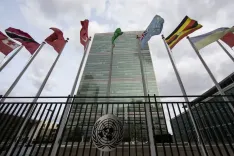What Led to the Barlow Affair of 1806: A Parliamentary Crisis over Patronage and Governance in India?

Synopsis
Key Takeaways
- Political Crisis: The Barlow Affair was a significant parliamentary crisis in 1806.
- Power Dynamics: It highlighted the struggles between the Crown and the East India Company.
- Constitutional Implications: The event questioned the legitimacy of political patronage over merit.
- Impact on Governance: Barlow's recall created instability in British India.
- Legacy: It marked a turning point in British colonial governance.
New Delhi, Nov 24 (NationPress) Amidst the political upheavals surrounding British India's governance, few events exemplify the complex power dynamics between the Crown, its ministers, and the East India Company as vividly as the recall of Sir George Barlow in 1806. This incident transcended the mere dismissal of an official; it became a constitutional flashpoint, challenging the established rights of the Company against the King's asserted prerogative. The ensuing debate in Parliament sent shockwaves through the administration in Calcutta, marking a pivotal moment in defining British authority in its expanding Eastern Empire.
The Recall: A Rapid Appointment and an Unexpected Turnaround
After the death of the notable Marquis Cornwallis in October 1805, Sir George Barlow, as the senior member of the supreme council, assumed the role of Governor-General of India. An esteemed servant of the Company, he was respected for his swift continuation of the peaceful and economical policies of his predecessor. His administration was recognized for its credibility, notably for securing peace treaties with the Maratha leaders Scindia and Holkar.
Understanding the importance of stability during these sensitive negotiations, His Majesty's ministers in London sought to confirm his position. On February 25, 1806, they recommended to the Court of Directors that Barlow be granted full powers as Governor-General, a decision the Directors accepted with enthusiasm. This move was met with great joy in Leadenhall Street, as Barlow was highly regarded, receiving numerous accolades.
However, this confidence was short-lived. Within just ten days to two weeks of the confirmation, the government expressed its wish to recall him. On May 12, a formal recommendation was made to replace Barlow with Lord Lauderdale. When the Directors resisted this change, the ministry advised the King to exercise his prerogative under the 1784 India Act. By the end of May, Sir George Barlow was officially recalled by a royal sign manual. In the House of Lords, Lord Minto, President of the Board of Control, confirmed that orders had been issued to “vacate the commission,” officially superseding Barlow. This abrupt reversal, following an initial appointment made by the ministry itself, became the focal point of the ensuing parliamentary storm.
The Company's Perspective: Upholding Merit and Stability
The East India Company's Court of Directors staunchly opposed the recall. Their argument, championed in Parliament by figures such as Lord Melville, was based on several key points:
- Patronage versus Merit: The primary objection was that the recall was driven by patronage rather than public good. Critics contended that the ministers were not acting out of any policy disagreement with Barlow, who was effectively executing the desired pacific system, but were seizing an opportunity to install their own political appointee, violating the spirit of the 1784 Act.
- Alienation of Company Servants: The recall was seen as a significant affront to the dedicated servants of the Company. It implied that the highest office in India was reserved for “men of rank in this country,” degrading all Company officials who revered Barlow and viewed his appointment as a validation of their career paths.
- Instability Concerns: The removal of a successful Governor-General amid critical negotiations and financial retrenchments created a leadership void, perceived as highly detrimental to India's stability at a precarious moment.
- Inconsistency in Actions: The Directors highlighted the government's glaring inconsistency. They initially recommended extending Barlow's powers, only to demand his recall within weeks, making the ministry's actions appear arbitrary and unjust.
The Government's Defense: Prerogative and Accountability
His Majesty's ministers, led by Lord Grenville and Lord Henry Petty, defended their actions on substantial constitutional and political grounds:
- Crown's Prerogative: The government’s core argument was that the 1784 Act explicitly granted the King the power of recall at his discretion. Lord Grenville asserted that it was “clearly in his recollection” from the original debates that this power was intended for ministerial use.
- Right to Confidence: Ministers claimed that, as the responsible party for the entire British Empire, they had both the right and the duty to appoint a Governor-General in whom they had confidence, likening the governance of India to that of Ireland.
- Temporary Appointment: Crucially, the government asserted that Barlow's initial confirmation was never meant to be permanent. Secretary Fox noted that the appointment was made to prevent any interregnum in India following Cornwallis's death, framing it as a temporary measure for continuity.
The Indian Perspective: The Effects of Distant Power Struggles
While the sources are British parliamentary debates and lack direct Indian voices, they allow for a clear understanding of how this London-centric power struggle would have impacted India:
- Political Instability: The most immediate effect was the creation of a leadership vacuum at the highest level of British authority. For native states like the Maratha, who were finalizing peace treaties, this abrupt change could have created significant uncertainty, potentially undermining the very treaties designed to ensure tranquility.
- Governing Systems Conflict: The debates in London mirrored broader discussions about governance in India. Barlow was viewed as a proponent of Cornwallis's pacific system, directly opposing the aggressive expansionism of Marquis Wellesley. The recall illustrated that Indian policy direction—whether towards conquest or conciliation—was subject to the political whims of a distant government rather than the actual needs within India.
- Devaluation of Experience: The key message sent to the entire British administrative and military apparatus in India was that practical experience was secondary to political connections in London. The recall of Barlow, who had dedicated most of his life to the Company, to be replaced by a “noble lord high in His Majesty's councils,” established a troubling precedent.
Sir George Barlow: A Figure Caught Between Systems
The debate illuminated Sir George Barlow's record, highlighting his role as a figure embodying the complexities of Company service. He was praised for his integrity and faithful execution of Cornwallis's policies, with Cornwallis himself wishing for Barlow to be his successor. Conversely, critics noted Barlow's eight years of zealous support for the expansionist system of Wellesley, accusing him of “dereliction of duty.” Defenders argued that his policy shift under Cornwallis was not mere compliance but a reflection of his sense of duty upon understanding the intentions of authorities back home.
In conclusion, the recall of Sir George Barlow was a landmark event that transcended one man’s career. It marked a decisive moment where the British government asserted its political authority over the East India Company, using the Crown’s prerogative to enforce its choice for the empire’s most prominent overseas position. For the Company, it was a bitter confirmation of their waning autonomy. For the government, it was a necessary exercise of ministerial responsibility. From an Indian perspective, it starkly illustrated how the fate of millions could be swayed by political maneuvers thousands of miles away, creating instability and uncertainty at the empire's core.
(The author is a researcher specializing in Indian History and contemporary geopolitical affairs)









